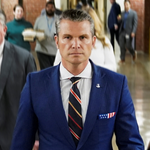John McCain’s first words onstage last night during the Republican National Convention — after his controversial vice-presidential nominee Sarah Palin finished her triumphant keynote address — were: “Don’t you think we made the right choice for the next vice-president of the United States?” It was impossible to ignore the fact that these words came as a question, not a statement. The relief in his voice was audible. The young Alaska governor had to at once introduce herself, defend her running mate, and attack Barack Obama — all without appearing shrill or nervous. It was a test she passed with flying colors, to be sure. But the buildup to her speech suggests that the Republican machine wasn’t quite so confident of her performance.
Throughout the early evening, the relatively staid audience visibly fought to pay attention and keep their enthusiasm up. Handheld signs weren’t choreographed, and speakers like Meg Whitman couldn’t seem to keep the crowd’s attention. But once Michael Steele, the GOPAC chairman, took the stage, the careful strategy began to unfold: The real nasty punches were thrown by McCain’s most well-known surrogates leading up to Palin, which would serve to soften the strikes at Obama from the newcomer herself. Steele introduced the chant “Drill, Baby, Drill!” that became a refrain throughout the night, and woke up the audience just in time for Mitt Romney’s series of overeager, high-pitched attacks on Obama. Romney’s lines seemed hysterical and overwrought: “I have one more recommendation for energy conservation: Let’s keep Al Gore’s private jet on the ground!” Har, har, Mitt. Can we have a new joke, please?
But Romney’s bluster came before any major networks picked up the convention feed. Former Arkansas governor Mike Huckabee and current Hawaii governor Linda Lingle spoke next. They were both funny and insightful, despite occasional missteps (Huckabee’s repeated story about radical schoolteacher Martha Cothren was a little confusing, and Lingle’s listing of Palin’s high-school athletic accomplishments only served to remind viewers that this is the sort of thing one deletes from one’s résumé right after college). Both also succeeded in framing Palin’s style of experience in the light which the GOP prefers: It’s executive, it’s all-American, and it’s tough.
By the time Rudy Giuliani took the stage, the audience was whipped into a fervor — which was necessary in order to swallow his sarcastic, nearly childish mocking of Barack Obama. His arguments about executive experience were undermined by his own nastiness, most notably when he called Barack Obama’s rise on the national stage “remarkable in its own right.” He couldn’t contain his own laughter when he added, “It’s the kind of thing that can only happen in America.” On CSPAN, some audience members appeared uncomfortable with this jibe, as it seemed to make a mockery of the candidacy of America’s first black presidential nominee. Giuliani also teased Obama for the notion that he might think that a mayor of Wasilla, Alaska, might not be “cosmopolitan” enough to be vice-president — which is not only something Obama has never argued, but also a very strange point for someone who ran for president based only on his experience as the mayor of New York City.
Nevertheless, Giuliani — whose place in the running order was switched yesterday — was the perfect palate cleanser for Palin herself. (Even if he did run long and force Palin’s introductory video to be cut.) And Palin, who had looked so nervous at an earlier rehearsal, took one look at that perfectly positioned ball and hit it right off the tee. Her speech was funny, it was tough, and it contained lines (by Bush speechwriter Matt Scully) that will be repeated for weeks to come. Some favorites:
• “I’m just one of many moms who will say an extra prayer each night for our sons and daughters going into harm’s way. Our son Track is 19 and one week from tomorrow, September 11, he’ll deploy to Iraq with the Army infantry in the service of this country.” [Service! Prayer! 9/11!]
• ” I guess a small-town mayor is sort of like being a community organizer, except that you have actual responsibilities.” [Obama is a commie! I’m a hard worker!]
• “I fought to bring about the largest private-sector infrastructure project in American history, and when that deal was struck, we began a nearly $40 billion oil and natural-gas pipeline to help lead America to energy independence.” [I deal with money in the billions of dollars! I was working on the energy crisis before it even happened!]
• “There is only one man in this election who has ever really fought for you.” [Enough said!]
Palin made forays into the foreign-policy realm using one of her strengths: energy policy. She managed to get Russia, Iran, and Venezuela into her speech by discussing oil prices. She ventured into riskier territory when she attacked Obama’s supporters for being overinspired and giving in to hope. And the most successful part of her speech was her introduction of herself and each member of her family. For voters who were yearning for a way to relate to her colorful entourage, this was the perfect move.
Palin’s speech was clearly not written to win over swing voters — it was too partisan, combative, and full of snide remarks. She also didn’t set an agenda for what kind of vice-president she would be. But what she did do was introduce herself as a competent (and even more important, real-seeming) orator and a tough cookie. The Republican base will be thrilled with this speech, and it will be interesting to see whether the Obama campaign (especially Joe Biden) is baited into going after Palin in kind, or it sticks to just attacking McCain.





























